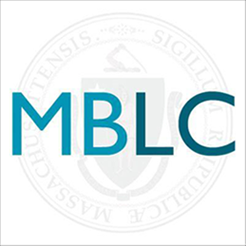The Cambridge Public Library has announced the January launch of the Cambridge Public Library STEAM Academy, in partnership with local nonprofit organization Innovators for Purpose.
Tag: lsta
Visiting Eastham and Reading Public Libraries: Town-Wide Preservation Assessments
By Evan Knight, Preservation Specialist at the MBLC
Since joining MBLC as Preservation Specialist last month, I quickly realized how important it is to get know the libraries, people, and collections that make our Commonwealth so culturally rich.
Much of my work here at MBLC is either project consulting (for annual LSTA direct grants) or general advisory services for collection management and risk assessment (e.g., water, fire, theft, intellectual control, light, temperature, humidity, pests, etc.).
So a few weeks ago, I reached out to Debra DeJonker-Berry, Director of Eastham Public Library, to learn more about her experiences leading recent projects in Eastham that related to both of those aspects of my work: an LSTA-funded Town-Wide Preservation Assessment and Collection Identification, and MBLC’s environmental monitoring program.
What a visit! She arranged a number of meetings around town with a couple of the local institutions who were a part of the Town-Wide grant, first with the volunteer staff of the Eastham Historical Society.
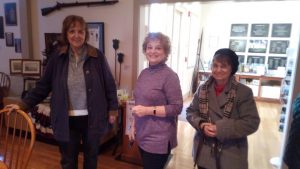
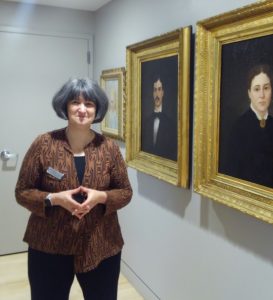
We talked about their continuing work to process their collections, best practices in the preservation of scrapbooks, and their digitization projects with Digital Commonwealth (and the challenges of preparing metadata), as we toured their Archives and storage spaces. The next visit was with the Town Clerk’s Office, who maintain and preserve some of Eastham’s oldest legal and historical documents (among many other responsibilities!). The public library plays a role in sharing and interpreting some of these old documents, the “ancient records” as they’re called, by providing electronic copies on CD and online. This is just another example, in the same spirit as the Town-Wide Assessment grant, of the collaborative vision Debra has for the Eastham Public Library. One of the greatest values of the Town-Wide project, as she put it, was having everyone at the same table talking about big-picture issues regarding their collections, now and for the future, together.
The Eastham Library, by the way, occupies a beautiful building, opened in 2016, that is worthy of a visit in its own right. We discussed their environmental monitoring report for their archives storage room, and although we didn’t find major concerns, they’re continuing to check their data every month to make sure the humidification system is working correctly.
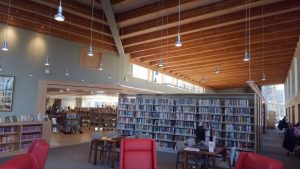

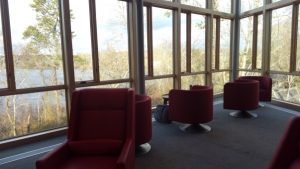
Reading Public Library is another institution pursuing an LSTA-funded Town-Wide Preservation Assessment and Collection Identification, and wouldn’t you know it, they have a beautiful building too, recently renovated! Amy Lannon, Director, hosted me for a recent visit to get to know their collections and better familiarize myself with their goals in this project.
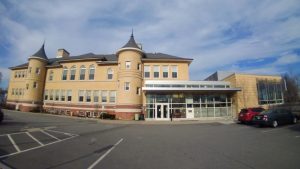
The Reading Antiquarian Society, the Reading Historical Commission, and the Reading Town Clerk will all participate with the Public Library to analyze their collections and determine their preservation needs.
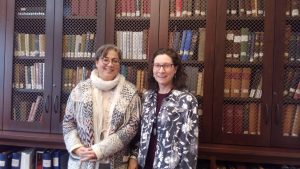
On my visit, I also spent a lot of time looking at the collection and the storage area with Eileen, Local History Librarian, to talk about collection development policies, security, oversize maps, environmental monitoring, and what to expect in the Assessment process.
It was a great pleasure to visit all of these institutions, and I was happy to see the work that MBLC is helping to support. But what I like most is meeting the folks who manage the collections and do the day-to-day work to preserve the cultural heritage of the Commonwealth. Thank you!
Reimagined Wellesley Branch Library Welcomes Librarians
By Shelley Quezada, Consultant to the Underserved at the MBLC
On October 29, 2018 staff from seven libraries that received FY19 LSTA grants for Mind in the Making: Supporting Play Spaces in Libraries convened for training in the beautiful repurposed Fells Branch of the Wellesley Public Library. In addition to Wellesley, the communities of Bedford, Bourne, Rutland, Shirley, Waltham and Shrewsbury will spend this year expanding opportunities for young children to participate in creative play activities in the library as well as to build, problem solve, think critically and even embrace failure as they become more confident and engaged learners. Under leadership of library director Jamie Jurgensen who applied for a LSTA grant, the library interior features wood replicas of Wellesley’s famous buildings as well as frescos of local flora and fauna that are both a delight to see and touch.
The Fells Branch, first opened in 1858 as a one-room schoolhouse, became a branch library in 1923 but recently has been used as a nursery school. Now, thanks to the generosity of the Wellesley Free Library Foundation and the Wellesley Foundation, the newly painted and refurbished branch opened to the public on November 17.
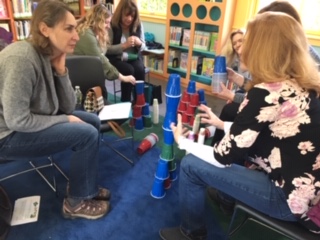
The LSTA training featured Alli Leake, Director of Education from the Discovery Museum in Acton who maintains a “Play Matters Blog” on the museum website. She invited librarians to engage in a play activity by cooperatively building structures with “found materials” which in this case were paper cups.
Additional support was provided by Jessie Kravette of the Boston Children’s Museum who shared some of the many BCM resources that support the importance of play.
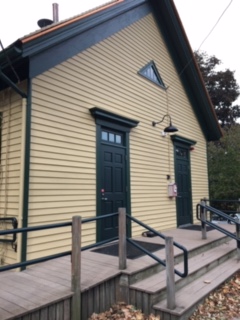
Participating librarians were excited to share some of the many ideas they will be implementing over the course of the coming year as they create interactive play and flexible learning spaces in their own libraries.
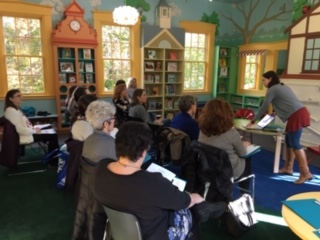
5 Things You Probably Didn’t Know Are In The Digital Commonwealth
The MBLC is now accepting applications for this year’s Town-Wide Preservation Assessment grant round. It’s an opportunity for Massachusetts libraries to work with a consultant to help them assess, organize, and ultimately digitize their historic and archival collections in the Digital Commonwealth.
Right now, there’s over 440,000 items from 130 participating institutions in this statewide digital repository. It’s a great tool for educators, historians, researchers, students, artists, authors – anybody with an interest in exploring the past through ultra-high resolution photographs, maps, letters, books, paintings, postcards, and more.
With so much content, there’s some bizarre and unexpected stuff tucked in as well. Below are five highlights from four of the most unique collections in the Digital Commonwealth.
1. Birdwing butterflies from the Solomon Islands, part of the Harry C. Belcher Lepidoptera Collection at Tufts Library in Weymouth.
2. Pheasant sculptures from the Castonguay Carved Bird Collection at West Yarmouth Library.
3. Food pouches from the Natick Soldier Systems Center Photographic Collection.
4. 1974 photo of the “Smithsonian Center for Short-Lived Phenomena” in Belmont, part of the Boston Public Library’s Spencer Grant collection. (By the way, this place actually existed – but fittingly enough, only from 1968-1975.)
5. Robot (ca. 1991) at the Natick Soldier Research, Development & Engineering Center. Also from the Natick Soldier Systems Center Photographic Collection.
